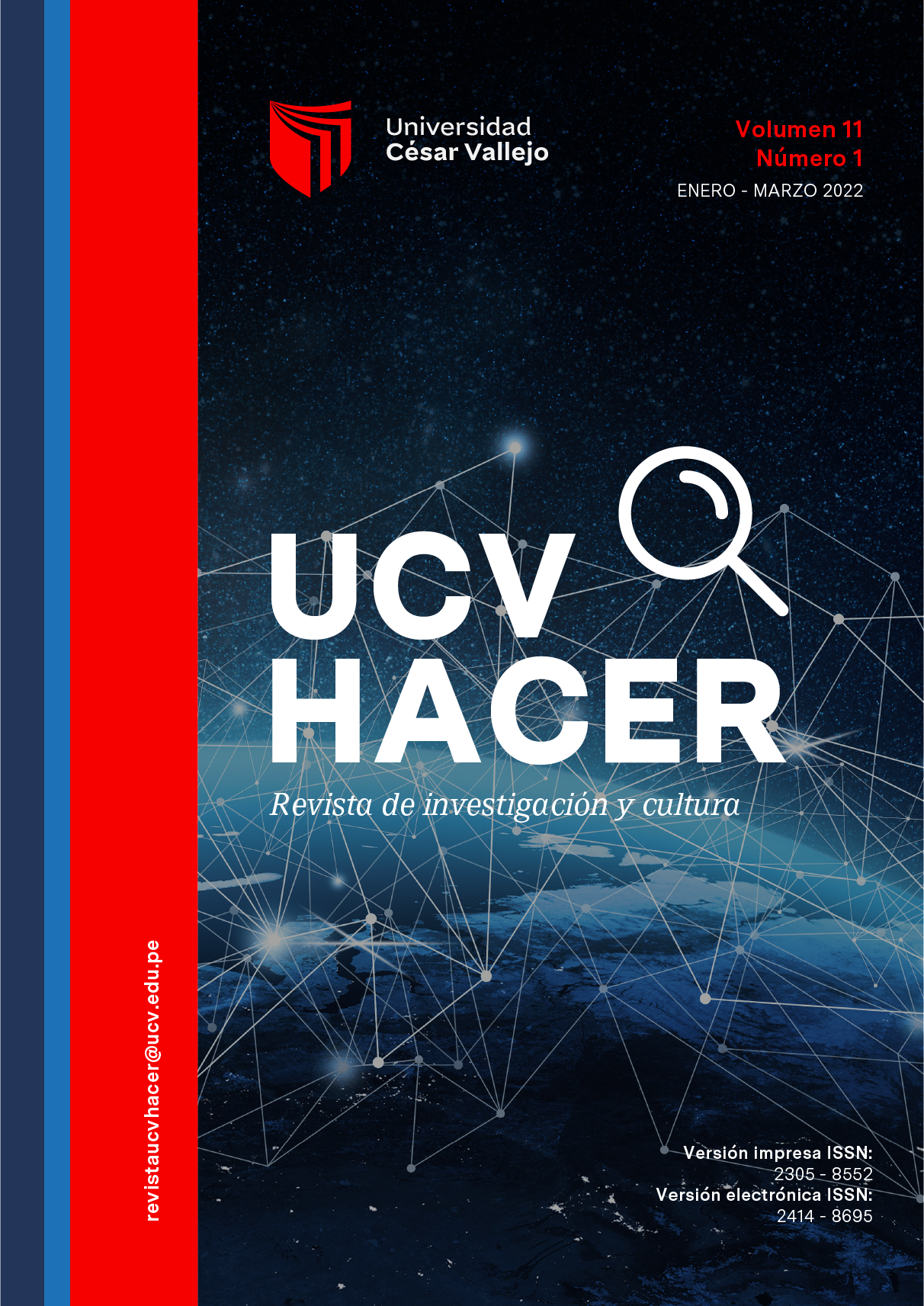Sharing economy in South America. A Systematic Review
DOI:
https://doi.org/10.18050/RevUCVHACER.v11n1a3Keywords:
Economía colaborativa, Consumo colaborativo, Producción colaborativa, Aprendizaje colaborativo, Finanzas colaborativasAbstract
The collaborative economy is the exchange of goods and services between members of a community, generally facilitated by technology. Experts argue that there are four clear types of collaborative economy: collaborative consumption, collaborative production, collaborative learning, and collaborative finance. This research posed the following research problem: what is the scientific evidence on the application of the collaborative economy in South America published in the Scielo and Redalyc databases in the last three years, and specifically, what basic groups of collaborative economy were alluded to, what types of business were analyzed, under what methodological approach are they studied, and finally, where in South America are the models of collaborative economy studied? Through a systematic review, it was possible to answer these research problems and fulfill the research objectives. Fifteen scientific articles were found, of which fourteen refer to collaborative consumption, one to collaborative production, and none to collaborative learning or collaborative finance from a purely business point of view. Similarly, the vast majority of the evidence obtained alludes to the hosting business (seven cases), is approached from the qualitative approach (ten cases), and details experiences in Brazil (eleven cases).
Keywords: Collaborative economy, collaborative consumption, collaborative production, collaborative learning,
collaborative finance, collaborative finance.
References
Algar, R. (08 de abril de 2007). Collaborative Consumption by Ray Algar. Oxygen Consulting, 4(1), 16-17. https://www.oxygen-consulting.co.uk/collaborative-consumption/
Bazzoun, M. (2019). The Digital Economy. International Journal of Social Science and Economics Invention, 5(9), 116-118. https://doi.org/10.23958/ijssei/vol05-i09/157
Botsman, R., & Rogers, R. (2011). What’s mine is yours: How collaborative consumption is changing the way we live (1.a ed.). New York: Harper Collins.
Botsman, R., & Rogers, R. (2014). What’s mine is yours: The rise of collaborative consumption (2.a ed.). New York: HarperCollins e-Books.
Coelho, P. F. da C., & Romero, C. B. A. (2020). Drivers of different types of collaborative consumption. Revista de Administração FACES Journal, 18(3). https://doi.org/10.21714/1984-6975FACES2019V18N3ART6669
De Oliveira Chagas, G. M., & Cruz Aguiar, E. (2020). The role of utilitarian and hedonic motivations in value co-creation and their relationship with AIRBNB experience. Revista Brasileira de Pesquisa em Turismo, 14(3), 158-176. https://www.rbtur.org.br/rbtur/article/view/1922
Dellacasa Levrini, Gabriel Roberto Nique, W. (2019). Sustainable Business Digital Technology-based model: BikePoa Case Study as an example. Revista de Administração da Universidade Federal de Santa María, 12(3), 544-561. https://doi.org/10.5902/1983465932759
Fernández-Bedoya, V. H., Gago-Chávez, J. de J. S., Meneses-La-Riva, M. E., & Suyo-Vega, J. A. (2020). Collaborative Economy in Peru: Past, Present and Future. Path of Science: International Electronic Scientific Journal, 6(5), 7001-7006. https://doi.org/10.22178/pos.58-5
González Bracco, M., & Kotschack, L. (2019). Lo físico y lo virtual en las prácticas turísticas urbanas. El caso de Buenos Aires - Argentina. Estudios y Perspectivas en Turismo, 28(2), 249-266. https://www.redalyc.org/articulo.oa?id=180760431001
Gruszka, K. (2017). Framing the collaborative economy – Voices of contestation. Environmental Innovation and Societal Transitions, 23(1), 92-104. https://doi.org/10.1016/j.eist.2016.09.002
Kitchenham, B. (2004). Procedures for performing systematic reviews (10a ed.) UK: Keele University.
Kitchenham, B., Pretorius, R., Budgen, D., Pearl Brereton, O., Turner, M., Niazi, M., & Linkman, S. (2010). Systematic literature reviews in software engineering – A tertiary study. Information and Software Technology, 52(8), 792-805. https://doi.org/10.1016/j.infsof.2010.03.006
Leites Farias, M., Alexandre Silva, L., & De Azevedo Barbosa, M. de L. (2019). Motivos Del No Uso De Los Servicios De Hospedaje Compartido Ofrecidos Por Las Plataformas Peer To Peer. Estudios y Perspectivas en Turismo, 28(4), 1104-1121.
Lima, S. H., Lima, D. S., Araújo, F. S., & Leocádio, A. L. (2018). Materialismo, individualismo y consumo colaborativo en turismo. Una investigación sobre los usuarios de Airbnb en Brasil. Estudios y Perspectivas en Turismo, 27(1), 24-42. https://www.redalyc.org/jatsRepo/1807/180755643002/html/index.html
Lobo, Y. S. (2020). Sharing economy and urban tourist destinations: analysis of Airbnb spatial distribution in Curitiba. Revista Brasileira de Pesquisa em Turismo, 14(3), 32-49. https://doi.org/10.7784/rbtur.v14i3.1841
Marulanda-Valencia, F. Á., & Restrepo-Montes, J. A. (2020). Una aproximación a los efectos negativos del hospedaje informal sobre lahotelería de gran formato en la ciudad de Medellín. Tendencias, 21(2), 124-145. https://doi.org/10.22267/rtend.202102.144
Mateus Felippe, A., Regina Rech, S., Silveira, I., & Da Rosa, L. (2020). Fashion lab as a factor of innovation in fashion authoring design. Modapalavra e-periódico, 13(30), 40-69. https://doi.org/10.5965/1982615x13302020040
Miki da Costa, L. K., Mascarenhas de Souza Pinheiro, P., & Fumi Chim-Miki, A. (2018). Determinantes de las referencias en couchsurfing.com. El “salto de fe” desde la hospitalidad online hacia la hospitalidad offline. Estudios y Perspectivas en Turismo, 27(3), 550-568. https://www.redalyc.org/articulo.oa?id=180757123004
Moher, D., Liberati, A., Tetzlaff, J., Altman, D. G., & PRISMA Group. (2009). Preferred reporting items for systematic reviews and meta-analyses: the PRISMA statement. PLoS medicine, 6(7), e1000097. https://doi.org/10.1371/journal.pmed.1000097
Paker, A. L. (2014). SciELO –15 Años de Acceso Abierto: un estudio analítico sobre Acceso Abierto y comunicación científica. Scientific Electronic Library Online. https://doi.org/10.7476/9789233012370
Pereira, C. H. T., & Silva, M. E. (2020). Understanding the integration of Socio-Technical Actors for Sharing and Sustainable Urban Mobility. Brazilian Business Review, 17(6), 706-724. https://doi.org/10.15728/BBR.2020.17.6.6
Petticrew, M., & Roberts, H. (2006). Systematic Reviews in the Social Sciences. (M. Petticrew & H. Roberts, Eds.), Systematic Reviews in the Social Sciences: A Practical Guide. Oxford, UK: Blackwell Publishing Ltd. https://doi.org/10.1002/9780470754887
Ramalho, F. R. X., & Rigo, A. S. (2020). Economia do compartilhamento: Aproximações e distanciamentos entre a noção e a prática da partilha. Contextus –Revista Contemporânea de Economia e Gestão, 18(1), 191-207. https://doi.org/10.19094/contextus.2020.44252
Rechene, S. T., Silva, M. E., & Campos, S. A. P. (2018). Sharing economy and sustainability logic: Analyzing the use of shared bikes. BAR – Brazilian Administration Review, 15(3), 1-18. https://doi.org/10.1590/1807-7692bar2018180026
Souto Maior-Cabanne, C. L., Melo Silva Luft, M. C., & França de Abreu, A. (2018). Turismo colaborativo. Un nuevo modelo de negocios en el rubro de la alimentación brasileña. Estudios y perspectivas en turismo, 27(1), 84-101. https://www.redalyc.org/journal/1807/180755643005/movil/
Stokes, K., Clarence, E., Anderson, L., & Rinne, A. (2014). Making Sense of the Uk Collaborative Economy. Nesta; Collaborative Lab.
Sutherland, W., & Jarrahi, M. H. (2018). The Economía colaborativa en Sudamérica. Una revisión sistemática sharing economy and digital platforms: A review and research agenda. International Journal of Information Management, 43(1), 328-341. https://doi.org/10.1016/j.ijinfomgt.2018.07.004
Yáñez-Duamante, C., Oliva-Figueroa, I., Catalán-Verdugo, G., & Moreno-Doña, A. (2019). “Other” educative space and ecological knowledge: Exchange and collaborative consumption trade fairs in Chile. Estudios pedagógicos (Valdivia), 45(1), 123-135. https://doi.org/10.4067/S0718-07052019000100123
Downloads
Published
How to Cite
Issue
Section
License
Copyright (c) 2022 UCV Hacer

This work is licensed under a Creative Commons Attribution-NonCommercial-ShareAlike 4.0 International License.










